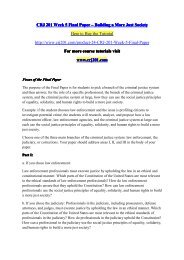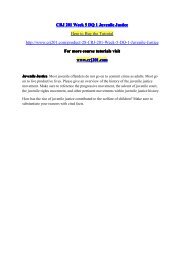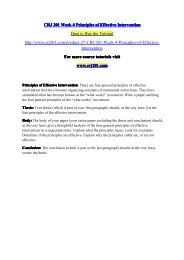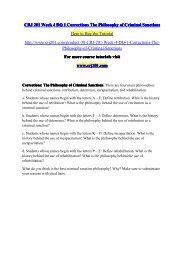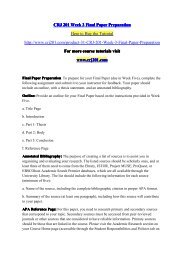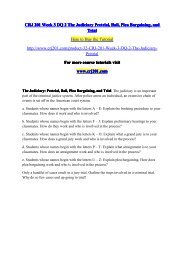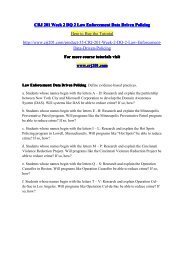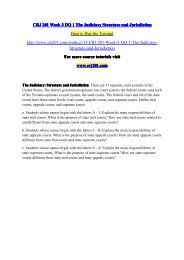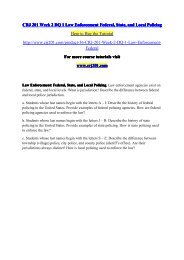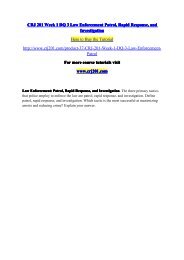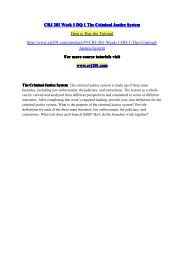CRJ 201 Week 2 Constitutional Policing / crj201dotcom
For more course tutorials visit www.crj201.com Constitutional Policing. Police must obey the law in their effort to control crime. Legal restrictions may hurt the efficiency of police but by obeying the law, police gain social legitimacy. When a police officer violates the law, they jeopardize the rights of the accused and the rights of the innocent. The Fourth Amendment of the Constitution states: “The right of the people to be secure in their persons, houses, papers, and effects, against unreasonable search and seizures, shall not be violated, and no warrants shall issue, but upon probable cause, supported by oath or affirmation, and particularly describing the place to be searched and the persons or things seized.”
For more course tutorials visit
www.crj201.com
Constitutional Policing. Police must obey the law in their effort to control crime. Legal restrictions may hurt the efficiency of police but by obeying the law, police gain social legitimacy. When a police officer violates the law, they jeopardize the rights of the accused and the rights of the innocent. The Fourth Amendment of the Constitution states:
“The right of the people to be secure in their persons, houses, papers, and effects, against unreasonable search and seizures, shall not be violated, and no warrants shall issue, but upon probable cause, supported by oath or affirmation, and particularly describing the place to be searched and the persons or things seized.”
- No tags were found...
Create successful ePaper yourself
Turn your PDF publications into a flip-book with our unique Google optimized e-Paper software.
<strong>CRJ</strong> <strong>201</strong> <strong>Week</strong> 2 <strong>Constitutional</strong> <strong>Policing</strong><br />
Here to Buy the Tutorial<br />
http://www.crj<strong>201</strong>.com/product-34-<strong>CRJ</strong>-<strong>201</strong>-<strong>Week</strong>-2-<strong>Constitutional</strong>-<strong>Policing</strong><br />
For more course tutorials visit<br />
www.crj<strong>201</strong><br />
crj<strong>201</strong>.com<br />
<strong>Constitutional</strong> <strong>Policing</strong>. Police must obey the law in their effort to control crime. Legal<br />
restrictions may hurt the efficiency of police but by obeying the law, police gain social<br />
legitimacy. When a police officer violates the law, they jeopardize the rights of the accused<br />
and the rights of the innocent. The Fourth Amendment of the Constitution states:<br />
“The right of the people to be secure in their persons, houses, papers, and effects, against<br />
unreasonable search and seizures, shall not be violated, and no warrants shall issue, but upon<br />
probable cause, supported by oath or affirmation, and particularly describing the place to be<br />
searched and the persons or things seized.”<br />
Read <strong>Week</strong>s v. United States, Silverthorne Lumber Company, Inc., Et Al. v. United States,<br />
and Mapp v. Ohio. For each court case, answer the following questions:<br />
a. What is the main issue or question involved in the case?<br />
b. What precedent or laws did the court use in order to come to its ultimate conclusion?<br />
c. How did the court apply the law to the facts of this case?<br />
d. What is the conclusion? Restate the issue to provide the final answer.<br />
How have these three cases formed the standards of constitutional searches and seizures in<br />
the United States?<br />
The paper must be three to four pages in length and formatted according to APA style. You<br />
must use at least two scholarly resources from the Online Library, other than the textbook, to<br />
support your claims. Cite your sources within the text of your paper and on the reference<br />
page. For information regarding APA, including.



